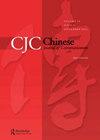From industrial movies to social media discourses: alternative social imaginaries of industry and technology in China
IF 1.9
2区 文学
Q2 COMMUNICATION
引用次数: 0
Abstract
AbstractThe paper is concerned with how Chinese public and civil society understand the so-called socialism with Chinese characteristics, or Chinese-style modernization, in the era of post-globalization capitalism and in light of their social imaginaries of technology and industry. The authors discuss historically formed as well as newly arising social imaginaries of the importance and role of industry, science, and technology in China when formulating an alternative, non-western vision of modernization presented in public cultural forms such as movies, TV dramas, social media discussions or broadcasted public conversations. The emphasis is on the particularity of the Chinese approaches toward industry, technology, and social development, and how they are similar to or different from liberal philosophies of technology.Keywords: Technology and industrializationsocial imaginaries of industrypost global capitalismnew developmental visionspublic culture Disclosure statementNo potential conflict of interest was reported by the author(s).Notes1 This is an ancient Chinese fable that tells the story of an elderly man who is trying to move two large mountains in front of his door so that his family and friends can travel more easily. When questioned about the feasibility of such a project, he tells his children and grandchildren to continue the task after his death. This reflects the spirit of generations of Chinese people continuing to do one thing until it is finally completed. During the Chinese revolution, “the foolish old man who removed mountains (Yugong Yi Shan)” was transformed into a modern spirit. In particular, in 1945, Mao Zedong, as the Chairman of the CPC, made a report on “Yugong Moves Mountains” in “The Seventh National Congress of the CPC.” He said that the people of China are working hard to remove the two mountains of ‘imperialism” and “feudalism” like Yugong. Nowadays, the dictum continues to refer to the spirit of perseverance and persistence needed in completing difficult projects.2 Bridge, (1949); March Forward to New China, (1951); The Girl from Shanghai, (1958); New Biography of Veterans, (1959).3 Both refer to the level of social development of the Soviet Union that China looked up to as an aspirational model.4 Joseph Needham holds a similar argument in his Science and Civilization in China series (Needham, Citation1974).5 Here comes the full video! Ren Zhengfei talks to America’s technology experts about tough questions, and he responds smartly) https://www.bilibili.com/video/BV144411G7gF?spm_id_from=333.337.search-card.all.click&vd_source=4ee0aa0810d2a8da9460970c2a97de0b.6 On July 24, 1959, an international Expo was held in Moscow, and the US sent a national exhibition. The exhibition showcased the highly modern and automated leisure and entertainment equipment of the US, demonstrating the prosperity and development of the capitalist system. In front of the kitchen booth of an American-style villa, US vice president Nixon and Soviet leader Khrushchev engaged in a debate on eastern–western ideology and nuclear war, which involved the advantages and disadvantages of the US capitalist system and the Soviet socialist system; hence the term “kitchen debate.”7 Commencement Speech by Zhang Wenhong in Graduation Ceremony of New York University, Shanghai: https://www.bilibili.com/video/BV1MK4y1V7B2/?vd_source=4ee0aa0810d2a8da9460970c2a97de0b.Additional informationNotes on contributorsHuiyu ZhangZhang Huiyu is a research professor and doctoral supervisor in the School of Journalism and Communication at Peking University. His research interests include film and visual culture, people, communication and cultural studies. He is the author of several articles and books, including Visual Modernity: The Emergence of the Subject in Twentieth-Century China, 2012; The Phantom of the Subject: Studies in Chinese Popular Culture, 2017; and Cultural Communication: Chinese Cinema in an Era of Transformations, 2022.Jing WuWu Jing is the professor of communication at the School of Journalism and Communication at Peking University. Her research areas are critical media and cultural studies, social theories of communication and media technology, and visual culture. She has published articles on topics concerning critical studies of media, culture and society, and authored the book Visual Expressions of Cultural Modernity: Ways of Seeing and Communication (2012).从工业电影到社交媒体话语:中国工业与技术的另类社会想象
摘要本文关注的是在后全球化资本主义时代,中国公众和公民社会如何根据他们对技术和工业的社会想象来理解所谓的中国特色社会主义或中国式现代化。作者讨论了历史上形成的以及新出现的关于工业、科学和技术在中国的重要性和作用的社会想象,并以电影、电视剧、社交媒体讨论或广播公共对话等公共文化形式提出了另一种非西方的现代化愿景。重点是中国在工业、技术和社会发展方面的方法的特殊性,以及它们与自由主义技术哲学的相似或不同之处。关键词:技术与工业化工业的社会想象后全球资本主义新的发展愿景公共文化披露声明作者未报告潜在的利益冲突这是一个古老的中国寓言,讲的是一位老人试图移动门前的两座大山,这样他的家人和朋友就可以更方便地旅行了。当被问及这样一个项目的可行性时,他告诉他的孩子和孙子在他死后继续这项任务。这反映了一代又一代中国人坚持做一件事直到最后完成的精神。在中国革命时期,“愚公移山愚公移山”变成了一种现代精神。他说,中国人民正在像愚公移山一样,努力拆除“帝国主义”和“封建主义”两座大山。如今,这句格言仍然指的是完成困难项目所需要的毅力和毅力桥,(1949);《向新中国进军》(1951);《上海姑娘》(1958);2 .《退伍军人新传》(1959)两者都指的是苏联的社会发展水平,中国视其为理想模式李约瑟在他的《中国科学与文明》系列中也有类似的观点(Needham, Citation1974)这里是完整的视频!任正非与美国的技术专家讨论了一些棘手的问题,他回答得很巧妙)https://www.bilibili.com/video/BV144411G7gF?spm_id_from=333.337.search-card.all.click&vd_source=4ee0aa0810d2a8da9460970c2a97de0b.6 1959年7月24日,莫斯科举行了国际博览会,美国派了一个国家展览。展览展示了美国高度现代化和自动化的休闲娱乐设备,展示了资本主义制度的繁荣与发展。美国副总统尼克松和苏联领导人赫鲁晓夫在一幢美式别墅的厨房摊位前,就东西方意识形态和核战争展开辩论,内容涉及美国资本主义制度和苏联社会主义制度的利弊;因此才有了“厨房辩论”这个词。7张文宏在上海纽约大学毕业典礼上的演讲:https://www.bilibili.com/video/BV1MK4y1V7B2/?vd_source=4ee0aa0810d2a8da9460970c2a97de0b.Additional信息投稿人张水宇张慧宇,北京大学新闻与传播学院研究教授,博士生导师。主要研究方向为电影与视觉文化、人、传播与文化研究。他撰写了多篇文章和书籍,包括《视觉现代性:20世纪中国的主体出现》(2012);《主体的幻影:中国大众文化研究》,2017;《文化传播:转型时代的中国电影》,2022年。京武武,北京大学新闻与传播学院传播学教授。她的研究领域为批判性媒体与文化研究、传播与媒体技术的社会理论以及视觉文化。她在媒体、文化和社会的批判性研究方面发表过文章,并著有《文化现代性的视觉表达:观看和交流的方式》(2012)一书。
本文章由计算机程序翻译,如有差异,请以英文原文为准。
求助全文
约1分钟内获得全文
求助全文

 求助内容:
求助内容: 应助结果提醒方式:
应助结果提醒方式:


